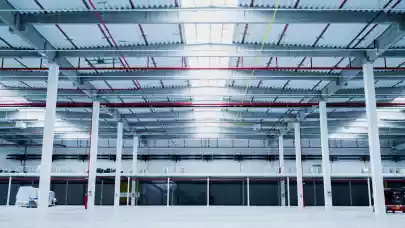
After the very successful years of 2021 and 2022, known as the golden period of development of the industrial market in Poland, 2023 was a period of greater challenges due to a change in the macroeconomic situation. The main reasons were high inflation, which affected the purchasing power of consumers, persistently high-interest rates, and uncertainty over the eastern border. The market grew, but at a slower pace, especially in the first half of the year, to accelerate at the end of 2023. Development activity in January-December 2023 amounted to 3.7 million sqm (-16% y/y), and as a result, the sector's total stock rose to 31.7 million sqm (+13% y/y). Another 2.8 million sqm (-16% y/y) remains under construction, about half of which is not under signed lease. Gross take-up (which does not include short-term leases) amounted to 5.6 million sqm, and despite a lower result versus 2021-2022, it was significantly higher than in the pre-pandemic period, i.e., 2018-2019, says Axi Immo.
Investment: Caution persists
After a year off in 2023, the industrial sector returned to the top in the investment market. The share of industrial logistics assets amounted to €966 million (-52% y/y) and accounted for 46% of the realized volume. The five-year average for the investment market shows that acquisitions of industrial products amounted to about 39% (2021 highest sector share - 51%, and 2019 lowest share - about 16%). Last year, out of approx. 25 buy-sell transactions, the largest recorded were the acquisition of an 80% stake in 7R by NREP and the sale of Panattoni Campus 39 in Wrocław to P3.
Grzegorz Chmielak, Head of Capital Markets and Valuation, Axi Immo, says: "Despite a generally weaker year, investors are still interested in industrial and logistics assets and believe this sector has the greatest stability. Since about the middle of last year, we have seen that yields have remained on an upward trend, and at the end of 2023, for prime products were around 6.5-6.75%. The market is awaiting the decisions of the ECB and the Fed in the context of interest rate cuts, which may trigger more investor activity, but not until the end of 2024. Other awaited positive news is that inflation has stabilized, as well as the resolution of the conflict across Poland's eastern border. In the long term, these could be crucial, among other things, for moving production to our part of Europe."
Take-up: Past the trough
As expected, due to the downturn in 2023, some of the previously active tenant groups decided to scale back plans for expanding and acquiring new space. On a year-on-year basis, these decisions slightly affected gross take-up statistics (excluding short-term contracts), which amounted to 5.6 million sqm (-15% y/y) at the end of December 2023. Ultimately, the third-highest result in the market's history in mid-2023 seemed challenging, given that total tenant activity closed deals for just over 1 million sqm. In contrast, net take-up, including new deals and expansions in 2023, was 3.4 million sqm (-24% y/y), indicating that last year tenants were more likely to opt for contract extensions, accounting for about 40% of completed deals. The three most active regions were Mazovian (1.4 million sqm, +4% y/y), Lower Silesia (1 million sqm, +23% y/y), and Silesia (910,000 sqm, -25% y/y). In 2023, unit transactions of more than 100,000 sqm were again closed, including for an e-commerce client at Park P3 Wrocław (265,100 sqm), a confidential fashion client at DL Invest Psary/Czeladź (120,000 sqm) and a logistics entry at CTPark Warsaw West (Wiskitki) for 110,000 sqm.
Anna Głowacz, Head of Industrial & Logistics, Axi Immo, comments: "In 2023, we could see two tempos occurring in take-up in the Polish warehouse market. The first half of last year was quite wait-and-see, with Axi Immo advising on the largest transaction of the period. In the Malopolska region, logistics operator MCG EastBridge decided to enter the Krakow area, taking 56,200 sqm at GLP Kraków III Logistics Centre. The second half of the year saw a peak and a clear rebound in take-up, with three major deals signed for around 0.5 million sqm. However, the clear trend throughout 2023 was consolidations due to the desire for optimization, while in the case of relocations, tenants were solid and chose new space within the same micro-location."
Supply: Improving sentiment
Similar to the take-up situation, Axi Immo analysts point out that we could also see two development rates on the supply side. The annual activity of developers culminated with the delivery of 3.7 million sqm (-16% y/y) of modern industrial space, which increased the sector's total stock to around 31.7 million sqm (+13% y/y). Last year, the most space was delivered in the first half of the year, i.e., 2.59 million sqm, accounting for about 70% of all projects completed in 2023. As for the lower volume of supply delivered from July to the end of December 2023, mention should be made of the change in financing structures for new developments, which required a higher share of pre-leasing agreements before construction began. Nevertheless, the regions with the largest new supply were Mazovian (702,000 sqm, 19% of delivered stock), Silesia (nearly 600,000 sqm, 16%), and Lubuskie (437,000 sqm, 12%). In the case of the last market, it is worth mentioning that no new project was delivered there in Q4 2023. On the other hand, among the largest completed projects of over 100,000 sqm were Panattoni BTS Zalando Bydgoszcz (Kuyavian-Pomeranian, 146,000 sqm), Panattoni Park Wrocław Logistics South Hub (Lower Silesia, 125,000 sqm), DL Invest Psary/Czeladź (Silesia, 120,000 sqm) and CTPark Ilowa (Lubuskie, 111,300 sqm). According to developers' announcements, as of the end of December 2023, there were about 2.8 million sqm under construction (-16% y/y), of which about 49% remains without signed leases. The undisputed leader among the regions is Lower Silesia (829,000 sqm under construction), ahead of Mazovia (478,800 sqm) and Łódzkie (402,900 sqm).
Vacancy: Further increases possible
At the end of 2023, the vacancy rate in the Polish industrial market reached 7.4% (+3.2 p.p. y/y). The highest vacancy rates were recorded in the Świętokrzyskie (18.4%), Lubuskie (14.2%) and Lodzkie (10.2%) Voivodeships. On the other side of the scale are the Pomeranian and Subcarpathian Voivodeships (1.7% each), the Lesser Poland Voivodeship (2.2%), and the Warmia and Masuria Voivodeship (2.6%). On the other hand, in absolute numbers, the largest amount of immediately leasable space is in the provinces of Mazovia (503,000 sqm), Łódzkie (461,000 sqm), Silesia (334,000 sqm) and Lower Silesia (333,000 sqm).
In big box developments, average base rates on the main markets ranged from 3.6 to 4.3 €/sqm/ month in older developments and 4.0 to 4.7 €/sqm/ month in new developments. The downward trend was evident in effective rates, especially in locations with high competition. Invariably, the most expensive location remains Warsaw City, where average offer prices in new developments reach a ceiling of up to €7.0. In contrast, in older ones, they stay at around € 6/sqm. In addition, selected projects in the Kraków region offer rents reach as high as €6.5.
Renata Osiecka, Managing Partner, Axi Immo, concludes: "We expect to continue to see an even development of the warehouse market in Poland in 2024. Benefiting from the maturity of our sector, developed patterns, experience, and location on the map of Europe, we remain an important market for companies interested in shortening supply chains and moving production closer to markets from Asia. On the take-up side, we also anticipate that many companies will seek further cost optimization, including consolidation, while developers will focus on developing projects in locations with less available space. In this situation, we expect vacancy levels to stabilize gradually. Macroeconomic indicators, especially those related to the consumer market, show positive sentiment, which may translate into demand for warehouse space from this group of tenants. On the other hand, the still weak sentiment among manufacturing companies in Western European countries may limit the growth of tenant-suppliers present in our country in the short term."



